Censorship, Civil Liberties, Criminalizing Dissent, Crony Capitalism, Human Rights, Supreme Court, Surveillance, Truth to Power, War Resister
Podcast: Play in new window | Download
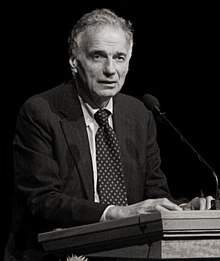
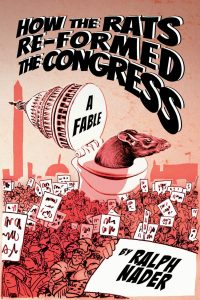
How the Rats Re-Formed Congress
A fable is a short tale that anthropomorphizes animals. The animals personify human virtues and vices, and function as an instrument of moral instruction. We mention this because Ralph Nader joins us to discuss his new book How the Rats Re-Formed Congress. It’s a Fable about an invasion of rats in Congress that triggers a peoples’ political revolt. It begins when a Congressional reporter breaks a bizarre story: “Rats have invaded the toilet bowls” of the Speaker of the House and the Minority Leader. A national news frenzy ensues.
Activists seize on the breaking story to organize for a populist agenda. Spontaneous rallies erupt. The activists see the rats upending “business as usual” routines on Capitol Hill as a symbol against lobbyists and corporate Congress. Millions flood into the nation’s capitol to take back Congress from Wall Street. Congressional offices are deluged with citizen rallies and meetings. Members are challenged in primaries. Incumbents join the movement.
Wall Street and its lobbyists warn of economic collapse and mass layoffs if the people’s agenda passes Congress. Corporate front groups are formed to disrupt peaceful crowds. Despite that, corporate lobbyists and think tanks can’t overcome the organized will of the determined citizenry. Tortmuseum.org
Listen to our past interview with Ralph Nader about the Tort Museum.
Guest – Ralph Nader, one of the nation’s most effective and well-known social critics. He has raised public awareness and increased government and corporate accountability. As a young lawyer in 1965 he made headlines with his book Unsafe at Any Speed, leading to congressional hearings and passage of a series of life-saving auto safety laws in 1966. His example has inspired a generation of consumer advocates, citizen activists and public interest attorneys. Full biography.
————————-

————————-
Civil Liberties, Human Rights, Surveillance, Targeting Muslims, Torture, Truth to Power
Podcast: Play in new window | Download
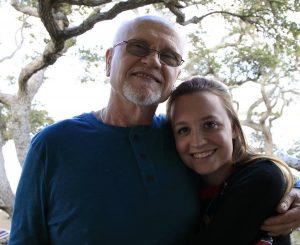
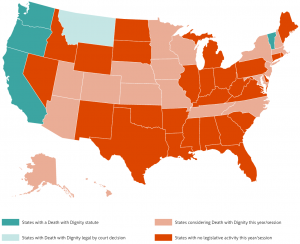
Death with Dignity
Seventy percent of Americans support the end-of-life option permitting qualified terminally ill people to end their lives through physician-prescribed medications. Despite this, forty-four states don’t have statutes outlining the procedure, and safeguards, for getting medications to hasten inevitable death.
Death with Dignity is a growing movement that works to ensure terminally ill Americans have the freedom to control their end-of-life options, including how they die. Its state-by-state campaign strives to change that.
California, Colorado, Hawaii, Oregon, Vermont, Washington and the District of Columbia have assisted dying statutes. They allow mentally competent, terminally-ill adult state residents to request and receive a prescription medication enabling them to die in a place and time of their choosing.
Guest – Mark Glaze is a strategist in public affairs, advocacy and politics. His clients have included the Open Society Institutes, the American Federation of Teachers, the Human Rights Campaign and Amnesty International. Mark is the former executive director of Everytown for Gun Safety, the nation’s largest gun violence prevention group. After the Newtown mass shooting the Wall Street Journal called him “the face of the gun control movement.”
—-
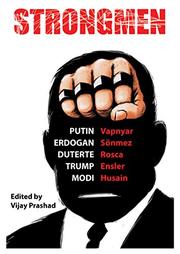
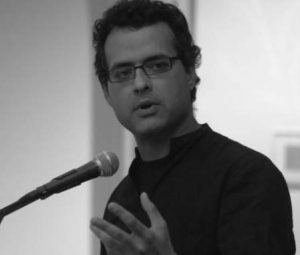
Strongmen
The spectacle and recent emergence of the strong man leader has been seen in a number of countries across the world, not only in the United States. We have witnessed the rise of Modi in India, Duterte in the Philippines, Erdogan in Turkey and Putin in Russia. In the 1920s and 1930s fascist dictators emerged in Germany, Spain, Portugal, and Italy. These men were monsters. The new kind of strongmen are not fascist dictators, but monsters nonetheless. We welcome professor Vijay Prashad who has edited and introduced the recently published book titled Strongmen. The book is a collection of five essays, some of them in the form of a fable, which explains the phenomena of the strong men.
Guest – Professor Vijay Prashad, is the executive director of Tricontinental: Institute for Social Research. He is the author and editor of several books, the most recent is titled Red Star Over the Third World.
Civil Liberties, Criminalizing Dissent, Human Rights, Political Prisoner, Prison Industry, Truth to Power
Podcast: Play in new window | Download
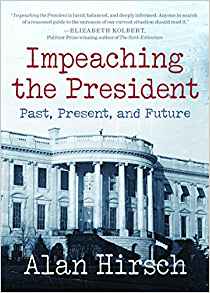
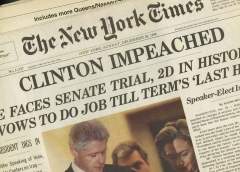
Impeaching the President: Past, Present and Future
Two U.S. presidents have been impeached: Andrew Johnson in 1868, and Bill Clinton in 1998. Richard Nixon would have been impeached but he resigned in 1974. Rumblings of impeaching the winner of the 2016 president elections even took place before the votes were in. Opponents of Hillary Clinton cited her use of a private e-mail server as Secretary of State as reason. Opponents of Donald Trump cited his business interests disqualified him. Possible criminal activities involving the Trump campaign added fuel to those calls.
Restraints on executive power exist because he greatest risk of tyranny comes from the executive branch. That’s partly because the president is a single person. In contrast, Congress and the Supreme Court must persuade a majority of their colleagues in order to act. As well, presidential authority as commander in chief includes the power to deploy weaponry as the head of the military and law enforcement.
The nation’s founding fathers value checks on tyranny. in part because of oppression by the British monarchy. At the Constitutional Convention some delegates opposed making one person responsible for executing the nation”s laws. While it decided in favor of a one-person executive, it adopted provisions aimed at preventing the president from becoming king-like.
Limits including four-year terms and voter approval to stay in office. The founders knew that even in four years the president could do much damage. So they created a mechanism for quicker replacement of the President if needed. The House of Representatives could “impeach” him, an accusation of wrongdoing that would prompt a trial in the Senate. If the Senate voted by two-thirds vote to convict the president, it would automatically result in removal from office. Impeachment can also be used to remove all federal officers.
Guest – Alan Hirsh, author of Impeaching the President: Past, Present and Future. Alan is a Lecturer in Humanities and Chair of Justice and Law Studies at Williams College. He’s also the author of For the People: What the Constitution Really Says About Your Rights and A Citizen’s Guide to Impeachment.
—-
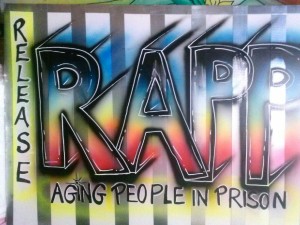
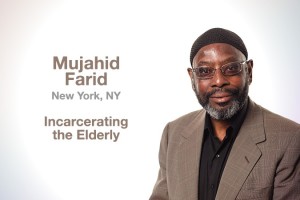
Remembering Mujahid Farid, Lead Organizer of Release Aging Persons in Prison
Today we remember and celebrate the life of Mujahid Farid who passed away last week in New York. Listeners will recall that Farid had been on Law and Disorder several times in the last few years, along with Laura Whitehorn and Dave George from his organization Release Aging Persons in Prison. In 1978, Farid was sentenced to 15 years to life in prison. He was 28 years old. He first became eligible for parole in 1993. He had earned four college degrees including two masters degrees while incarcerated. He was denied parole nine times. As we’ve discussed in prior segments, New York state parole commissioners denied his requests as with many others based on the nature of his crime rather than he many accomplishments he made while in prison.
In an article in the Village Voice, Farid noted that he asked the commissioners: “Is there anything I can do to make myself eligible for release?” He didn’t get a response but said he saw disapproving changes in the body language and facial expressions of the commissioners that his question wasn’t welcome. He was denied again. These denials added 18 years to his incarceration.
In 2011, Farid appeared before the parole boar for the tenth time. He stood before two new commissioners who had high rates of granting parole and that year, Farid was released. Farid became a 2013 Soros Justice Fellow. During his confinement, in 1987 Farid was part of a trio that created and proposed the first HIV/AIDS peer education program in New York State prisons, that later developed into the widely acclaimed state-wide program called PACE (Prisoners AIDS Counseling & Education). Farid participated in the creation of a college certificate program sponsored by New York Theological Seminary, and he taught introduction to sociology courses for people training for Alcohol and Substance Abuse (ASAT) counseling certification.
Since his release Farid initiated two programs designed to have an impact on dismantling mass incarceration: The RAPP Campaign and the Rise & Shine Small Business Coalition, the latter providing support for the creation and start-up of community businesses operating on principles of social entrepreneurship. In 2013 Farid was awarded a joint New York State legislative commendation for his community work and a Citizens Against Recidivism, Inc. award for social activism.
As listeners may recall, the number of people aged 50 and older in New York State, where RAPP was founded, has doubled since 2000; it now exceeds 10,000— which is about 20% of the total incarcerated population. This reflects a national crisis in the prison system and the extension of a culture of revenge and punishment into all areas of our society.
RAPP focuses on aging people in prison, many of whom are long-termers convicted of serious crimes. Many of these human beings have transformed their lives and developed skills and abilities they lacked before incarceration. They could be released from prison with little or no threat to public safety. Yet many are denied release, often for political reasons, and they needlessly remain imprisoned into old age. These elders could return to their communities if current mechanisms such as parole and compassionate release were correctly utilized.
Farid, you are in our thoughts and we send you our love.
Guest – Laura Whitehorn is a former political prisoner and native New Yorker, who was active in supporting groups such as the Black Panther Party, the Black Liberation Movement and was active with Students for a Democratic Society and the Weather Underground. Laura worked to help expose the FBI’s Counter Intelligence programs.
Guest – Mujahid Farid co-founded the Prisoners AIDS Counseling and Education program and helped design prison-based sociology and theology courses that allowed others to earn college-credited in prison. He also earned four college degrees and other certifications while incarcerated, including his paralegal certificate, NYS Department of Labor Certificate in Human Development Counseling, and NYC Department of Health Certificate in HIV/AIDS Counseling.
—————————-

—————————-
CIA Sponsored Terror, Civil Liberties, Habeas Corpus, Human Rights, Iraq War, Political Prisoner, Torture, Truth to Power, War Resister
Podcast: Play in new window | Download
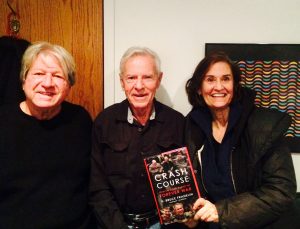
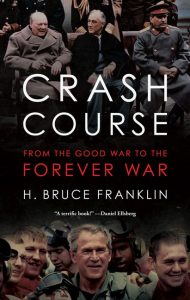
Crash Course : From the Good War to the Forever War
US Army Ranger turned conscientious objector Rory Fanning recently wrote in this in The Guardian newspaper: “Last week Sunday ,November 11, we celebrated Veterans Day. It used to be called Armistice Day and was a celebration of peace after the slaughter of World War One. Now it is called Veterans Day. The United States has 668 military bases around the globe. The United States has conducted military operations in 2/3 of the world’s countries since September 11, 2001. It has spent 3/4 of $1 trillion each year on it’s military – more than the next 13 countries combined. The US has taken hundreds of thousands of lives around the world these past 14 years and shows no signs of slowing down.“
Guest – H. Bruce Franklin, is one of America’s leading cultural historians, H. Bruce Franklin is the author or editor of nineteen books and more than 300 articles on culture and history published in more than a hundred major magazines and newspapers, academic journals, and reference works. He has given over five hundred addresses on college campuses, on radio and TV shows, and at academic conferences, museums, and libraries, and he has participated in making four films. He has taught at Stanford University, Johns Hopkins, Wesleyan, and Yale and currently is the John Cotton Dana Professor of English and American Studies at Rutgers University in Newark. Before becoming an academic, Franklin worked in factories, was a tugboat mate and deckhand, and flew for three years in the United States Air Force as a Strategic Air Command navigator and intelligence officer. Professor Franklin is touring the country to speak about his just publish book Crash Course : From the Good War to the Forever War.
—————————

—————————
Civil Liberties, Criminalizing Dissent, Crony Capitalism, Human Rights, Prison Industry, Surveillance, Targeting Muslims, Truth to Power, War Resister
Podcast: Play in new window | Download


Chris Hedges – America: the Farewell Tour
We are living in terrible times. Novelist Barbara Kingsolver has said that “it feels like the end of the world.” Last week hurricane Michael destroyed much of the Florida Panhandle. Before that hurricanes decimated Puerto Rico and before that Houston and before that New Orleans. Climate scientists predict it will only get worse and that we are rapidly running out of time to hold the disaster.
Many people have observed that Trump is a symptom, not the disease. The insurgency in the Republican Party has installed a purposeful, strategic and successful ultra right into power in all three branches of the Federal government and in the legislatures of half the states.
The war in Afghanistan has been pursued for 17 years. Iraq and Libya have been destroyed. The military budget was increased by 10% and is now some $700 billion a year, half of what the government spends all together. Are we on the verge of climate catastrophe, a great economic crash, or the end of the American empire?
Guest – Chris Hedges has written 11 books including the recently published America: the Farewell Tour. Although he is a recipient of the Pulitzer Prize for journalism, Chris Hedges was pushed out of the New York times where he was reporter for publicly criticizing the Iraq war. Pulitzer-Prize winning author and journalist. He was also a war correspondent, specializing in American and Middle Eastern politics and societies. His most recent book is ‘Death of the Liberal Class (2010). Hedges is also known as the best-selling author of War is a Force That Gives Us Meaning (2002), which was a finalist for the National Book Critics Circle Award for Nonfiction.
———————

———————
CIA Sponsored Terror, Civil Liberties, Criminalizing Dissent, Crony Capitalism, Human Rights, Surveillance, Truth to Power
Podcast: Play in new window | Download
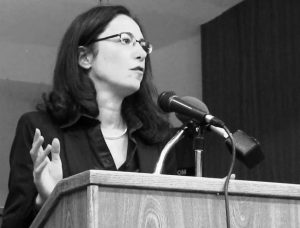

Regulation Designed to Tax Protesters For First Amendment Activity
The Trump administration has another first for America. It wants demonstrators to pay to use public parks, sidewalks and streets to engage in free speech. The effect of taxing protesters in the nation’s capital will be to restrict access for First Amendment activities to the very few who can afford it. Participatory democracy will be no more.
Interior Secretary Ryan Zinke in August announced the White House’s rewriting of regulations governing free speech and assembly on public lands under federal jurisdiction.
The National Park Service will charge protesters for so-called event management expenses. Barricades and fencing that police may erect, trash removal, sanitation charges, permit application charges, salaries of personnel deployed to monitor protests, as well as cost deemed harmful to turf. The Park Service claims protest-related costs are burdensome, and said that last year’s Women’s March imposed “a pretty heavy cost” on the government.
Guest – Mara Verheyden-Hilliard, co-chair of the Guild’s National Mass Defense Committee. co-founder of the Partnership for Civil Justice Fund in Washington, DC, she secured $13.7 million for about 700 of the 2000 IMF/World Bank protesters in Becker, et al. v. District of Columbia, et al., while also winning pledges from the District to improve police training about First Amendment issues. She won $8.25 million for approximately 400 class members in Barham, et al. v. Ramsey, et al. (alleging false arrest at the 2002 IMF/World Bank protests). She served as lead counsel in Mills, et al v. District of Columbia (obtaining a ruling that D.C.’s seizure and interrogation police checkpoint program was unconstitutional); in Bolger, et al. v. District of Columbia (involving targeting of political activists and false arrest by law enforcement based on political affiliation); and in National Council of Arab Americans, et al. v. City of New York, et al. (successfully challenging the city’s efforts to discriminatorily restrict mass assembly in Central Park’s Great Lawn stemming from the 2004 RNC protests.)
—-


U.S. Plans To Overthrow Venezuelan President?
Recently people in the Trump administration held secret meetings with certain military leaders of Venezuela to discuss plans to overthrow Venezuelan elected President Nicolas Maduro.
The White House said in a statement that it was important to engage in “dialogue with all Venezuelans who demonstrate a desire for democracy“ in order to “bring positive change to a country that has suffered so much under Maduro.” The economic situation in Venezuela has been dire. This has been exacerbated by a US financial embargo. It is estimated that 1,600,000 people have left Venezuela since 2015.
Guest – William Camacaro is a Venezuelan living in New York City and a senior research fellow at the Consul of Hemispheric Affairs, Washington DC best non-governmental organization founded in 1975. Camacaro is a cofounder of the Alberto Lovers Bolivarian Circle of New York, an organization founded in solidarity with Venezuela.
——————-

——————-


















